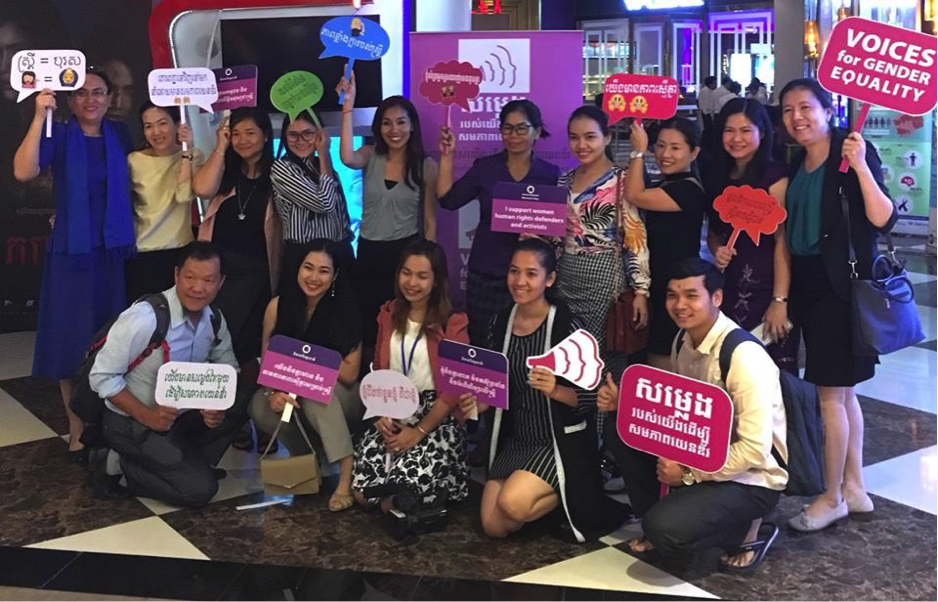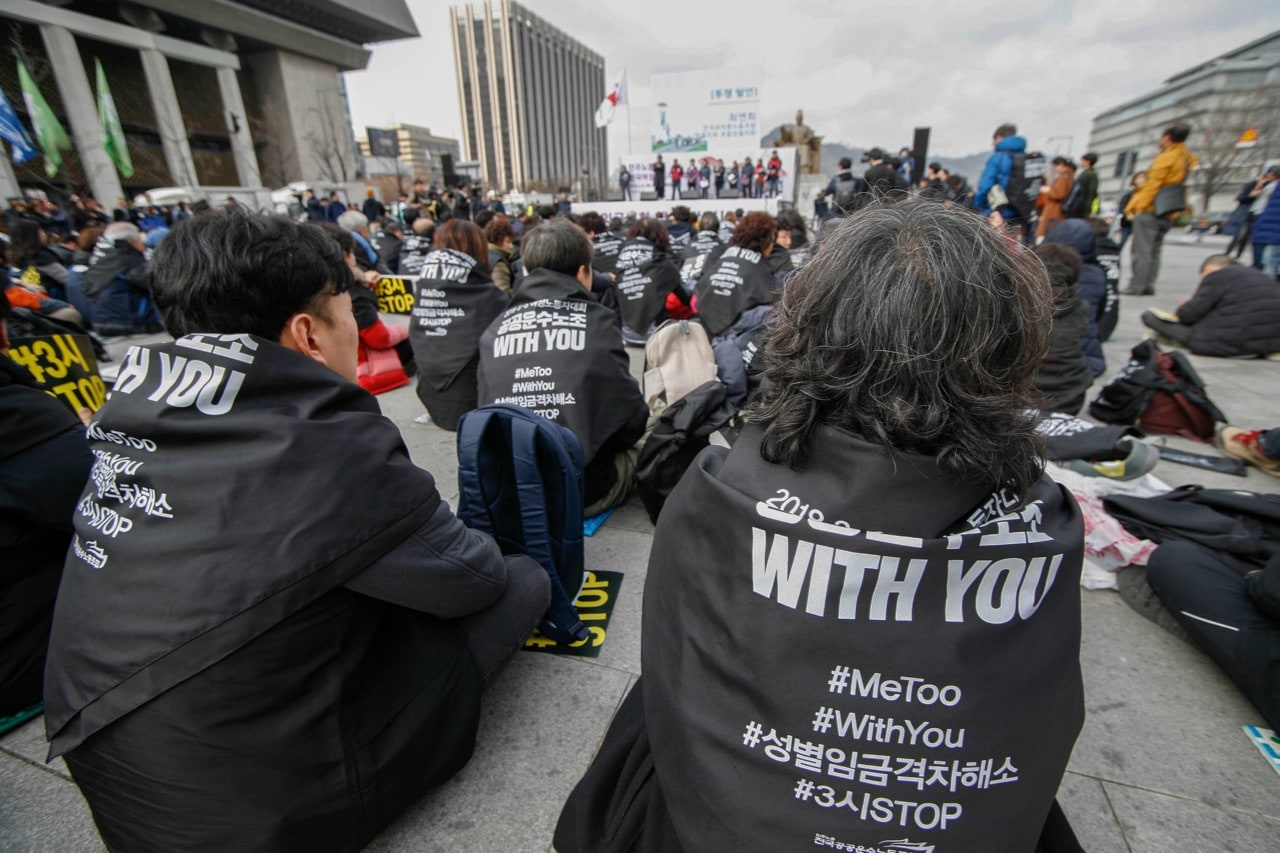A roundup of key free expression news in Asia, based on IFEX member reports.
International Women’s Day marches attacked
Various groups celebrated International Women’s Day (8 March) across the Asia-Pacific region by holding protest marches, submitting petitions to governments, and building online solidarity. These initiatives mobilized thousands of women and human rights advocates; unfortunately, some groups tried to oppose these peaceful activities, reflecting the continuing difficulties in promoting gender equality in the region.
The women’s march in Malaysia (#WomensMarchMY) gathered hundreds in the nation’s capital and successfully presented five key demands to the government, namely the elimination of gender discrimination; an end to rape culture and sexual violence; equal opportunities and wages; strengthening women’s participation in politics and democracy for all; and stopping the destruction of the environment. But some participants of the march were attacked by men who claimed to be anti-LGBTQI+ and accused the marchers of promoting anti-Muslim teachings.
Meanwhile, the Centre for Independent Journalism paid tribute to women media workers who are struggling in a “deeply entrenched patriarchal culture and structures.” They urged all stakeholders to “address the cultural and structural problems within the media institution that continues to marginalize women.”
Backlash against “Rise of Sisterhood” in Pakistan
Massive crowds joined the Aurat March in the cities of Lahore, Karachi and Islamabad. The march mainly called for an end to violence against all women and gender minorities in Pakistan.
The Aurat March demands – Watch this space as we share them each day till the 8th March!1. An End to Violence pic.twitter.com/MGzWCqPzoo
— AuratMarch2018 (@AuratMarch2018) March 6, 2018
But images of the event were used by groups which then harassed and even sent death threats to some participants and organizers.
Digital Rights Foundation (DRF) bemoaned the online backlash experienced by those who joined the march. “The Aurat March was the first public procession for a lot of women, thus targeting them is akin to pushing them out of these spaces and creates an additional burden for women who want to raise rights issues through peaceful protest which is a fundamental and constitutional right of every citizen.”
Indonesia: #LawanBersama (#FightTogether)
Over a thousand people joined the Women’s March in more than a dozen Indonesian cities calling for justice and protection of women’s rights. Participants also denounced the passage of legislative measures that outlaw adultery as well as the sharing of information about contraception and sexual education.
Privileged & humbled to march with so many inspiring & awesome women this morning at #womensmarchjkt #LawanBersama #jakarta #intersectionality pic.twitter.com/UA2ap0nsJC
— Victoria Forsgate (@VictoriaFors) March 3, 2018
South Korea: #MeToo and #WithYou against sexual harassment
In South Korea, prosecutor Seo Ji-hyun appeared on TV and revealed that she was sexually harassed by a senior prosecutor in 2010.
Her testimony inspired other victims of sexual violence to come forward, share their experience, and identify their aggressors. Some of those accused of sexual violence included famous actors, academics, and politicians.
Netizens actively supported the #MeToo campaign against sexual harassment. On March 7 the National Human Rights Commission of Korea issued a #WithYou statement in support of all victims of sexual crimes.
Cambodia campaign: “Voices for Gender Equality”
IFEX members Cambodian Center for Independent Media (CCIM) and Cambodian Center for Human Rights (CCHR) were part of a coalition that chose International Women’s Day to launch the “Voices for Gender Equality” project in Cambodia. They urged the government to train local authorities on how to handle cases related to gender violence without compromising the safety and dignity of women, girls and LGBTQI+ individuals. They also called for the reaffirmation of the right of women to participate in public life in Cambodia at a time when the opposition and other critical voices are being silenced by the ruling party.
Men’s March for women in Nepal
IFEX member Freedom Forum was among 20 organizations which organized the Men for Women March in Nepal. The march, which gathered more the 400 participants, distributed sanitary pads to promote awareness about gender issues and health rights, and emphasized the importance of men’s in the protection of women’s rights.
Pakistan: Universal Periodic Review at the UN HRC
Pakistan was under the spotlight last month as IFEX, ARTICLE 19, and Pakistan Press Foundation delivered a statement during Pakistan’s Universal Periodic Review, at the 37th session of the UN Human Rights Council.
The oral statement reminded the Pakistani government that it has yet to substantially address the concerns raised by human rights groups about the continuing state-directed persecution of journalists and activists under the pretext of strengthening national security.
Below is an excerpt:
“Journalists continue to face serious threats to their security: more than 20 journalists and media workers have been killed since Pakistan’s last UPR, and many more have suffered serious attacks including enforced disappearance, assault, acts of intimidation, and judicial harassment. Impunity for all such attacks remains pervasive.”
The statement recommended the inclusion of civil society groups in reviewing blasphemy laws and other legislation that undermine freedom of expression.
China: Censorship on the heels of constitutional reform
Chinese authorities aggressively blocked online keywords related to constitutional reforms that removed the term limits for top officials.
The changes in the constitution would allow incumbent President Xi Jingping to remain in power indefinitely.
To prevent Chinese netizens from criticizing or even commenting on this important political development, censors were quick to remove a list of terms from social media such as “Emperor Xi,” “the Emperor’s Dream,” “Dream of returning to the Great Qing,” “Winnie the Pooh” (who is often compared to Xi), “I don’t agree”, “re-election”, “election term”, “constitution amendment”, “constitution rules”, “proclaiming oneself an emperor”, “Yuan Shikai (former emperor)”, among others.
But netizens found various ways to circumvent censorship by using riddles, jokes, and creative memes.
A journalist’s dramatic eye-roll during a press forum – one that was caught on video and essentially broke the Chinese internet – also broke the silence over the intensified internet censorship in recent months. It exposed the tight grip imposed by Chinese authorities over the media coverage of party sessions on one hand, and the inability of the state to absolutely prevent netizens from expressing their political views on the other.
Media killings in India
Journalists Sandeep Sharma, Naveen Nishchal, and Vijay Singh were killed in separate vehicle incidents in India. Sharma had recently exposed an illegal sand-mining mafia operation that allegedly involved some police and local officials. Meanwhile, Nishchal and Singh had had a heated argument with a former “mukhiya” (village chief) over a news report.
These are the first media-related killings in India in 2018. According to the International Federation of Journalists (IFJ), 11 journalists and media workers have been killed in the country in the past two years.
State of emergency in Sri Lanka
A state of emergency was declared in Sri Lanka. Anti-Muslim violence had erupted after the death of a Buddhist man over a traffic dispute. The government subsequently ordered all telecommunication operators to restrict access to various social media websites. The decision to block the internet was criticized by media and human rights groups. Free Media Movement (FMM) said that the “actions taken to prevent the use of social media to trigger hate and violence should not be allowed to hinder democracy by contravening a citizen’s right to freedom of expression.”
A group of women rights activists signed a statement deploring the violence while raising concerns related to human rights, emphasizing that “online spaces have proven especially important for women, ethnic and sexual minorities and other historically marginalized groups, in exercising their right to freedom of expression.”
In brief
Malaysia’s proposed anti-Fake News bill has alarmed civil society groups, which warned that this piece of legislation “is yet another attempt to stifle debate and criminalize those who speak out against corruption and human rights violations.”
Indonesia has a new law known as MD3 which criminalizes “criticism” or “disrespect” for parliament or its members.
Burma’s Parliament has approved the Peaceful Demonstration and Marching in Procession Law Amendment Bill, despite the opposition of more than 230 civil society organizations. The amended law makes it more difficult to organize peaceful protest assemblies in the country because of new information that needs to be submitted to the police, such as the cost of the activity, financial contributors of the rally, and the program or agenda of the protest. Moreover, any peaceful assembly can be deemed a violation of the law if it is organized “with the intention of harming the stability, rule of law, peace and tranquility of the community” – vague language which could be open to abuse.
And finally, Singapore’s Public Order and Safety (Special Powers) bill empowers the Home Affairs minister to impose a “communication stop order” in response to a “serious incident”. How serious? The bill specifies that a sit-down protest that “impede[s] the flow of vehicular and pedestrian traffic and interfere[s] with normal trade of business activities in the area” could justify activation of these powers.
The “communication stop order” could ban the taking of photographs, videos, or sending text or audio messages within a specified area. Groups are worried that this could be used to criminalize the work of journalists and citizen reporters.

Launch of the “Voices for Gender Equality” projectCCHR/Facebook
